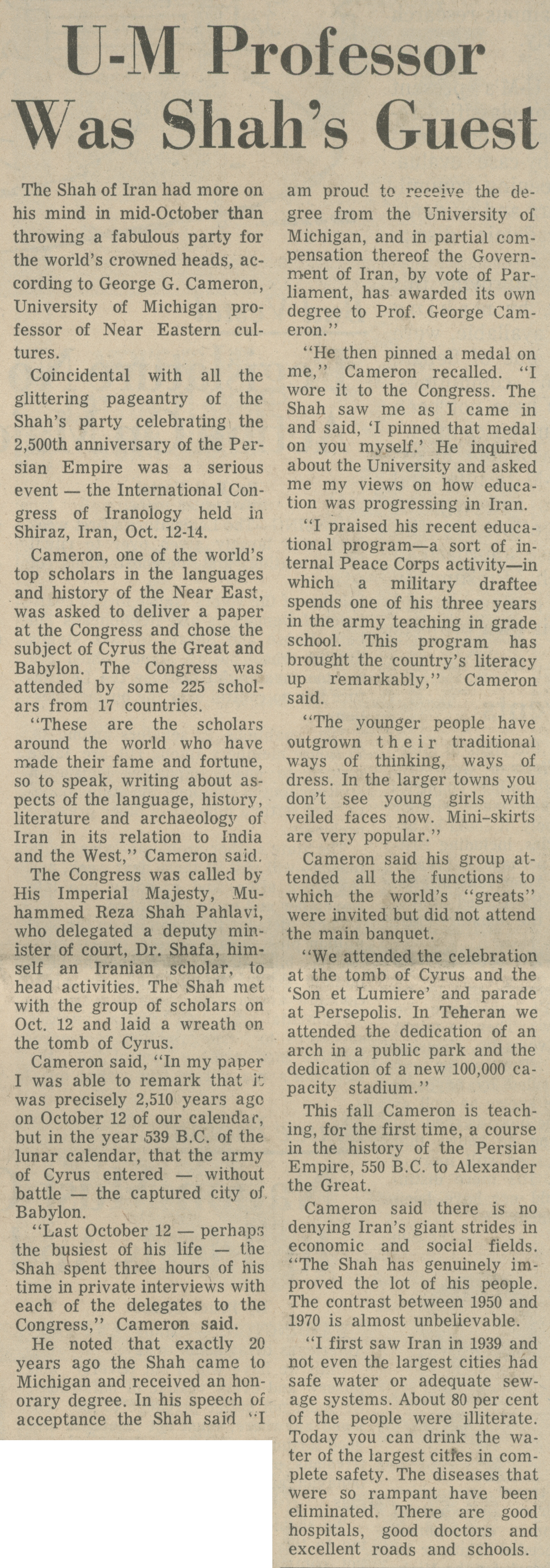U-M Professor Was Shah's Guest

The Shah of Iran had more on his mind in mid-October than throwing a fabulous party for the world’s crowned heads, according to George G. Cameron, University of Michigan professor of Near Eastern cultures.
Coincidental with all the glittering pageantry of the Shah’s party celebrating the 2,500th anniversary of the Persian Empire was a serious event – the International Congress of Iranology held in Shiraz, Iran, Oct. 12-14.
Cameron, one of the world’s top scholars in the languages and history of the Near East, was asked to deliver a paper at the Congress and chose the subject of Cyrus the Great and Babylon. The Congress was attended by some 225 scholars from 17 countries.
“These are the scholars around the world who have made their fame and fortune so to speak, writing about aspects of the language, history, literature and archaeology of Iran in its relation to India and the West,” Cameron said.
The Congress was called by His Imperial Majesty, Muhammed Reza Shah Pahlavi, who delegated a deputy minister of court, Dr. Shafa, himself an Iranian scholar, to head activities. The Shah met with the group of scholars on Oct. 12 and laid a wreath on the tomb of Cyrus.
Cameron said, “In my paper I was able to remark that it was precisely 2,510 years ago on October 12 of our calendar, but in the year 539 B.C. of the lunar calendar, that the army of Cyrus entered – without battle – the captured city of Babylon.
“Last October 12 – perhaps the busiest of his life – the Shah spent three hours of his time in private interviews with each of the delegates to the Congress,” Cameron said.
He noted that exactly 20 years ago the Shah came to Michigan and received an honorary degree. In his speech of acceptance the Shah said “I am proud to receive the degree from the University of Michigan, and in partial compensation thereof the Government of Iran, by vote of Parliament, has awarded its own degree to Prof. George Cameron.”
“He then pinned a medal on me,” Cameron recalled. “I wore it to the Congress. The Shah saw me as I came in and said, ‘I pinned that medal on you myself.’ He inquired about the University and asked me my views on how education was progressing in Iran.
“I praised his recent educational program – a sort of internal Peace Corps activity – in which a military draftee spends one of his three years in the army teaching in grade school. This program has brought the country’s literacy up remarkably,” Cameron said.
“The younger people have outgrown their traditional ways of thinking, ways of dress. In the larger towns you don’t see young girls with veiled faces now. Mini-skirts are very popular.”
Cameron said his group attended all the functions to which the world’s “greats” were invited but did not attend the main banquet.
“We attended the celebration at the tomb of Cyrus and the ‘Son et Lumiere’ and parade at Persepolis. In Teheran we attended the dedication of an arch in a public park and the dedication of a new 100,000 capacity stadium.”
This fall Cameron is teaching, for the first time, a course in the history of the Persian Empire, 550 B.C. to Alexander the Great.
Cameron said there is no denying Iran’s giant strides in economic and social fields. “The Shah has genuinely improved the lot of his people. The contrast between 1950 and 1970 is almost unbelievable.
“I first saw Iran in 1939 and not even the largest cities had safe water or adequate sewage systems. About 80 per cent of the people were illiterate. Today you can drink the water of the largest cities in complete safety. The diseases that were so rampant have been eliminated. There are good hospitals, good doctors and excellent roads and schools.